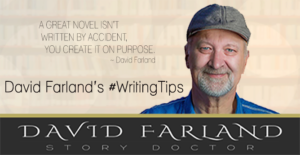Dealing with criticism is a gracious art. It’s always important to know when to consider the criticism and when to let it go. If we don’t know the difference, we’ll always feel like something’s gone wrong and we’ll doubt ourselves. In yesterday’s post, Story Doctor David Farland talked about how to take criticism. Today’s post is on dealing with it. Thank you David for allowing us to reprint your sage advice!
Ace Jordyn
PS: read to the bottom to find out how you can download a free book with over 200 of David’s favorite writing tips!
A Guest Post by David Farland
www.mystorydoctor.com
I’ve been talking about how to deal with criticism, and I’d like to talk a bit about how to deal with criticism that you disagree with. There are a lot of reasons that people will dislike your work that have nothing to do with your work.
If you look at online reviews of Lord of the Rings, which is widely acclaimed as perhaps the best fantasy novel ever written, you’ll find a lot of people who hate it. Does that mean that the book stinks? I don’t think so. Does it mean that the critic is wrong? How can they be wrong in telling you that they don’t like it?
What it really comes down to is that the book isn’t to their tastes. Lord of the Rings is a fantasy adventure that is slanted heavily toward a male audience. It’s a metaphor for life during wartime during WWII, and so it’s something of a “buddy tale,” that plays strongly on beats of wonder, adventure, and friendship. It’s a great novel, if you have a taste for that kind of thing.
So when a critic speaks, you have to look at that critic closely. What is the person’s age and sex? What is their cultural heritage and religious background? What are their political assumptions? All of those things (and more) play into their critiques.
So just be aware that any critique may have more to do with a preference for chocolate over vanilla rather than the genuine value of the work.
Then of course you must ask, did the critic read the story properly? Did they understand it? Very often a momentarily lapse in the critic’s memory will cause the person to rant and rave for hours about how the author messed up. Even my own professional editors will often say, “Now wait a minute–I thought this character’s mother was still alive!” Then I have to refer the editor to that touching four-page scene that he or she forgot about. It happens to all of us. We get distracted by ringing phones or children or our own problems.
In fact, assuming that you really do tell your story beautifully, achieving the effects that you desired, then virtually all of the negative responses that you get from critics will typically fall into one of these two categories—the reader either has different tastes from you, or the reader made a mistake.
If you have “errors” that you can’t account for, it’s typically that you are forced to exchange one value for another. For example, you might find that in order to maintain your pacing during a fight scene, your character just doesn’t “have time” to explain the internal functions of the fancy new gun that he’s firing. You will have a gun enthusiast rail that “I really want you to explain why these Glocks have such a great recoil!” But you just don’t have time for it.
Other than that, you pretty much have to own up to any real “mistakes,” and just be grateful for readers who will point them out to you.
 David Farland is an award-winning, New York Times bestselling author who has penned nearly fifty science fiction and fantasy novels for both adults and children. Along the way, he has also worked as the head judge for one of the world’s largest writing contests, as a creative writing instructor, as a videogame designer, as a screenwriter, and as a movie producer. You can find out more about him at his homepage at http://www.davidfarland.net/. Also check out more great advice in his book Million Dollar Outlines. And take some of his online workshops at http://mystorydoctor.com.
David Farland is an award-winning, New York Times bestselling author who has penned nearly fifty science fiction and fantasy novels for both adults and children. Along the way, he has also worked as the head judge for one of the world’s largest writing contests, as a creative writing instructor, as a videogame designer, as a screenwriter, and as a movie producer. You can find out more about him at his homepage at http://www.davidfarland.net/. Also check out more great advice in his book Million Dollar Outlines. And take some of his online workshops at http://mystorydoctor.com.
Now for the free book! Anyone who signs up for David’s newsletter can download a free book with 100 of his favorite writing tips–that’s over 300 pages of writing tips! Check it out at www.mystorydoctor.com.
